Xbox Series X review: Microsoft's next-gen flagship rated
Read T3's Xbox Series X review now to find out if this is the next-gen console you should buy
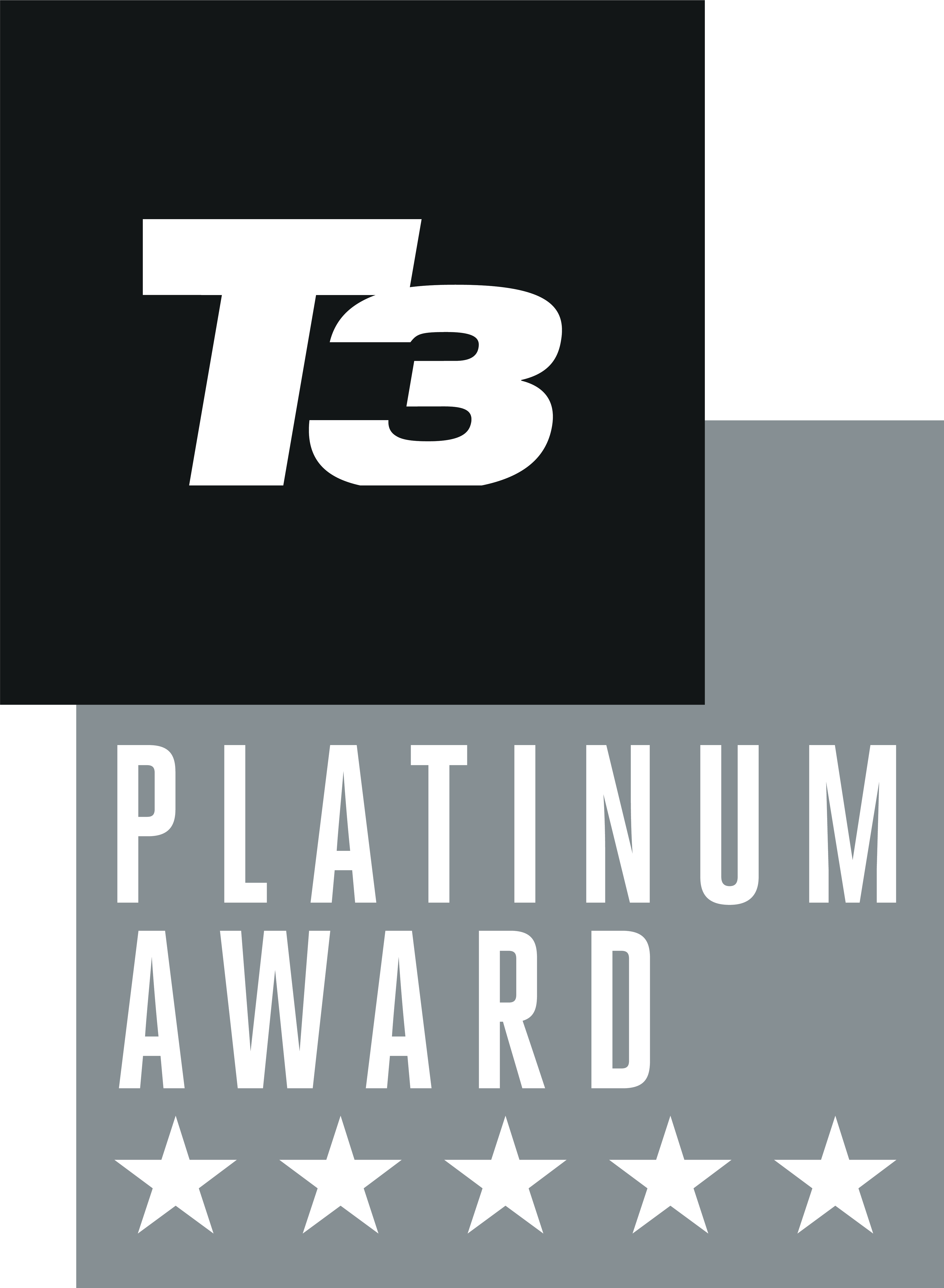
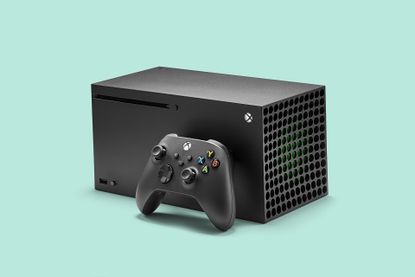
In creating this Xbox Series X review, one thing has become very clear – from a hardware point of view Microsoft has absolutely nailed it with its next-gen flagship.
-
+
The most powerful console
-
+
Strong backwards compatibility
-
+
Easy expandable storage
-
-
Console design is uninspired
-
-
Only about 800GB of 1TB drive useable
-
-
Launch line-up of games is underwhelming
Why you can trust T3

This Xbox Series X review will take you through everything you need to know about this next-gen console from what it looks like and its features to how it actually feels to play on.
To cut right to the chase, it's phenomenal and definitely worth splashing out on even if there are still a few kinks that need to be ironed out.
As well as the core Xbox Series X review, you can find out more about the pricing and availability of the console as well as what equipment I used while testing it out.
This review started out at launch and I've been updating it as and when I discover new things about it.
- PS5 review: the Sony PlayStation 5 rated
- Xbox Series S review: would you be better with this digital only console?
Xbox Series X review: 6-month update
So, here we are roughly half a year in to the Xbox Series X's first year and, well, the console has been mechanically a big success. To date the console hasn't locked up on me once and I'm still amazed at how quiet it is. The Xbox Series X's design may not look very inspiring but it definitely does the job in terms of keeping things cool and quiet.
Where things have not been as great is on the gaming side of things, with me spending most of my time playing the third party Assassin's Creed Valhalla on the system, as well as enhanced games that already exist such as Star Wars Jedi: Fallen Order, which is just fantastic running at 4K 60fps.
The truth is that the system is still suffering from the Halo Infinite no-show at launch, which if it had happened, would of given the Xbox Series X the launch battle victory. It didn't, though, and that left the Xbox Series X to launch without any new AAA exclusive. As a result Sony PS5 walked away with the win and, while things haven't been great on PlayStation 5 either over the first 6 months, it is now starting to see exclusives like Returnal and Ratchet and Klank: Rift Apart launch.
Xbox Series X, though, is still waiting on the promise of next-gen exclusive games. Halo Infinite is coming but is still half a year from releasing, while Microsoft's nuclear option purchase of Bethesda means Series X and Series S are going to get plenty of exclusive new games, but when they will appear currently remains largely unknown.
Thank god then for Xbox Game Pass Ultimate, which is the best-in-class Netflix-for-games service in the world right now. Thanks to this service I've never been short of something to play on the Xbox Series X – even if I've not really needed its immense power to do so.
As such, I'd say Xbox Series X ownership has so far been just about par for the course. But it needs new games, and fast.
Xbox Series X review: how T3 tested the console
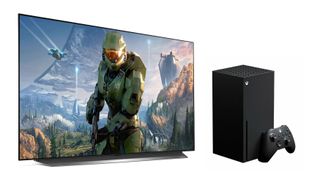
T3 used the 2020 model LG CX55 4K TV to test the Xbox Series X.
The Xbox Series X is Microsoft's next-gen flagship console, and as it comes with a host of powerful display options and features, we wanted to do it justice in terms of the TV we used. We needed the best gaming TV on the market today.
The natural choice was the T3 Awards 2020-winning LG CX, which has not only received a maximum score of 5 stars from us in our LG CX review, but is also top of our prestigious best gaming TV guide, too.
This is a panel that was perfect for making use of the Series X advanced gaming features, with its 120Hz refresh rate, HDR support, 4K resolution, and AMD Freesync compatibility which is ideal for making games look amazing.
Want the same setup for your Xbox Series X? View the best LG CX deals available right now.
Xbox Series X review: price and release date
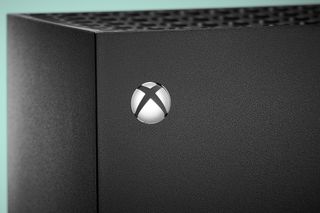
The Xbox Series X release date was November 10, 2020.
The Xbox Series X launched at $499.99 in the US, £449.99 in the UK, €499.99 in Europe and AU$749 in Australia to buy outright up-front.
Microsoft is running its Xbox All Access program, too, which let's you pay $34.99 a month for 24 months to get the system with a 2-year sub to Xbox Game Pass Ultimate. Here at T3 we think this purchase program is excellent, if hamstrung right now at launch due to a lack of available consoles.
Microsoft deserves a hat tip, though, for offering it to gamers, as it makes a very expensive piece of gaming hardware much more affordable.
As evidenced by T3's Xbox Series X pre-order guide, getting hold of an Xbox Series X has proved very difficult, as official stock at the Microsoft Store, as well as retail partners like Amazon, and Walmart, ran dry. However, in recent months, stock has improved and while you are unlikely to see any big discounts over Amazon Prime Day, there are likely to be some great bundles and peripherals featured.
For today's best Xbox Series X prices be sure to consult the deals charts below.
Xbox Series X review: unboxing and design
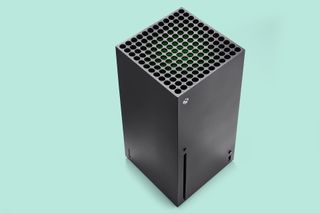
The Xbox Series X design is a matte black rectangular prism.
As can be seen in the below Xbox Series X unboxing video, the console comes very securely packaged. The contents of the box include the console itself, as well as the new model Wireless Xbox Controller, batteries for the controller, a power lead, HDMI cable, and product and quick start guides.
The console itself is a black rectangular prism that's more than twice as fat as the Xbox One X console that proceeded it. In terms of design, there is no doubting that the Series X is clean and minimalist, and I can see it blending into a lot of setups quite easily. In that sense, I think Microsoft has succeeded. This is a console that will not offend the eye.
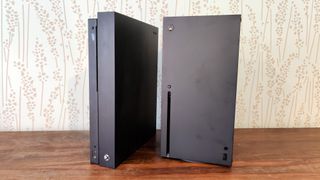
The Xbox Series X alongside its predecessor flagship, the Xbox One X.
Equally, though, from my personal perspective, I feel the design is really uninspired. This is basically the safest play I can think of, and can't help feeling just a little underwhelmed when looking at it. This is the most powerful games console on Earth – but it looks even more dull than a NAS drive.
Naturally, for you it could look amazing. Beauty is in the eye of the beholder, after all.
Getting the system set up physically is a piece of cake. You simply choose an orientation for the Xbox Series X (I went with horizontal as I wanted to place it in my cabinet under the LG CX55 TV). then plug in the power cord and connect the system to one of the TV's HDMI ports with the included cable.
Quick note here on positioning: the Xbox Series X when running at full tilt, expels quite a lot of hot air, and its cooling system is designed to draw air in from the base of the console and expel it through the the top. This means that ideally you want to keep the console well ventilated, and not block in its top or bottom.
As you can see from the images, this may be harder than you're used to with your existing consoles, as the Series X is considerably fatter than the Xbox One.

The Xbox Series X on top of the Xbox One X, showing the difference in design and size.
The front of the Xbox Series X is adorned with just a single USB port, as well as a small disc eject button, and controller syncing button. Round the back things get more interesting.
Flanked by a brace of cooling vents is the console's port selection, which includes the aforementioned power and HDMI connections, as well as a wired Ethernet port, brace of USB ports, and the console's storage expansion slot (more on that later).
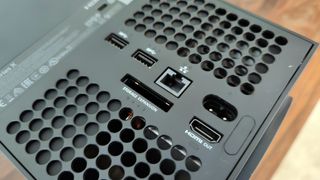
The Xbox Series X's rear selection of ports.
Overall, the Xbox Series X package is as you would expect, and setting it up physically is very straightforward. The design – while quite dull and uninspired in my mind – does, I admit, look mature and understated, if not quite delivering on a sense of awe and power.
Xbox Series X review: hardware and setup
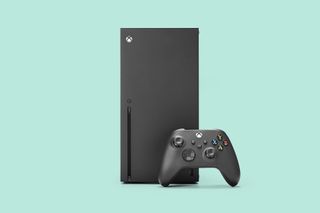
The Xbox Series X along with its Wireless Controller.
As can be gleaned from the tech spec listed above, the Xbox Series X is a video game console powerhouse. Indeed, it's the most powerful console on Earth on paper, bested only by very powerful gaming PCs.

When you turn the Xbox Series X on, this is the screen you are greeted with.
Packing 12 teraflops of processing power, which is delivered thanks to a combination of AMD's latest Zen 2 and RDNA 2 architectures, and paired with a custom 1TB NVME SSD storage drive, the Series X absolutely smokes Xbox's last flagship, the Xbox One X.
This is a console that can go the distance
Microsoft has absolutely nailed it with the Xbox Series X's hardware in my opinion. This is a console that has enough power to really go the distance and power, in my mind, an entire generation of great gaming experiences.

Setup of the Xbox Series X takes place in the companion Xbox app on mobile or tablet.
To start tapping into the console's power, though, it first needs setting up. Now, interestingly this is almost entirely handled not on the console itself, but through the companion Xbox app, which must be downloaded on a mobile device or tablet.
Through this app you can setup an Xbox account (or log in if you already have one), link the device to the console for setup, and then be guided through a setup wizard.

You setup a variety of things including updates and privacy settings.
As can be seen in the nearby screengrabs from the app, this setup entails everything from updating the console's firmware, through setting up an internet connection, dictating privacy and communication settings, allowing or blocking automatic game updates, establishing an energy profile, and much more besides.

If you have multiple Xbox consoles in the house then you can designate which room they are in.
Overall, I found the setup procedure of the console on the Xbox app very straightforward. It's slightly different at first to be directed away from the new piece of hardware you've bought to a secondary device, but the app works well and I had no problems in terms of linking my phone with the console.
One thing that did throw me for a second, though, was that as part of the setup procedure you're tasked with updating the controller's firmware, and the on-TV prompts direct you to press the controller's power button to initialise the sync with the console (the controller at this point has not been turned on).

I had to plug the Xbox Series X controller in to get it to sync with the system.
For me, though, the controller would not sync wirelessly, which for a moment left me stuck. After retrieving a USB Type-C to USB cable to plug the controller directly into the Xbox Series X, though, and pressing the power button, it was detected, updated, and then synced for wireless use.
This was quite odd, though, as when reviewing the Xbox Series S for T3, and going through the same setup procedure, I could just press the power button and wirelessly sync the controller out of the box. Odd, but worth bearing in mind if you face the same issue when setting up.
Xbox Series X review: games and performance

First game I played on the Xbox Series X? Halo 5 of course. If only Halo Infinite had been a launch title...
Let's deal with performance on the Xbox Series X first. The Xbox Series X target for gameplay is 60fps at 4K resolution, while also offering a 120Hz refresh rate and theoretical maximum framerate of 120fps, and as you can see from the image below, this is delivered out of the box.
I enabled a 4K UHD resolution, HDR and 120Hz refresh rate on my LG CX55 TV straight away and, let me tell you, there's no going back (even to the Xbox One X) after you've sampled this smoothness and fidelity.
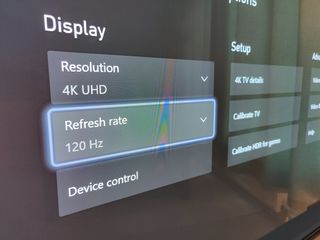
120 Hz refresh rate? Yes please!
I test a lot of T3's high powered gaming PCs and laptops, as well as mobile phones, so high refresh rates, framerates, and resolutions aren't new to me by any means, but there was still no escaping the immediate sense of upgrade I had when transitioning from Xbox One X to Xbox Series X.
And, aside from visual fidelity and smoothness (more on that soon), the biggest upgrade is the speed at which everything loads – especially games.
There was no escaping the immediate sense of upgrade
I'm a huge fan of Forza Horizon 4 on Xbox One, but even on the last-gen flagship, the loading times on that title were absolutely appalling. For the uninitiated, I'm not exaggerating – gamers around the world often reported waiting up to 5 minutes for the game to load initially and that, quite frankly, was not acceptable.
It lead to a position, for me at least, where I always was second guessing if something had gone wrong and the game had hung, so guess what I did when I got the Xbox Series X? Yep, that's right – installed Forza Horizon 4, which is one of the games that has been optimised for Xbox Series X.
And – as you can see from the loading video above – on Xbox Series X, Forza Horizon 4 launched from title screen to in-game in just 30 seconds; multiple minutes to just 30 seconds – now that is an improvement.
And that improvement is thanks to the Xbox Velocity Architecture and, even more specifically, its NVMe SSD.
Unlike the outgoing Xbox consoles, which were shipped with HDD storage, the Series X comes with SSD storage as standard, and it's much quicker. As can be seen with Forza, this doesn't just relate to new games, either, with older titles benefiting from the quicker read and write times the SSD offers.
The Xbox Series X is like the Xbox One gone Super Saiyan
And, what's more, it's not just single game loads that the Xbox Series X excels at, but multiple games, thanks to its excellent Quick Resume feature. Quick Resume lets you open and play multiple games, and then have their states saved by the console so that you can quickly flip between them as desired.
Check out the below video, which shows you how quick you can be playing multiple games within seconds.
I personally am a huge proponent of advances like this that, while not glamorous, make the overall experience with a product orders of magnitude better. On previous-gen hardware only one game could be cached like this, meaning every time you loaded up a different game the previous was wiped and would then have to be reloaded through credits and menu screen.
With Quick Resume on Xbox Series X, those days of painfully slow loading times are gone.
Playing these games with a 120 Hz refresh rate, and at a 4K resolution with HDR turned on and framerate of 60 fps+ is truly jaw-dropping, too. Until you experience how crisp and smooth these titles run on Series X you can't get a good idea of how it transforms the gaming experience. Simply put, I couldn't go back to Xbox One.
The Xbox Series X is like the Xbox One gone Super Saiyan; it's the same entity fundamentally, but one that is transcendentally faster and more powerful.
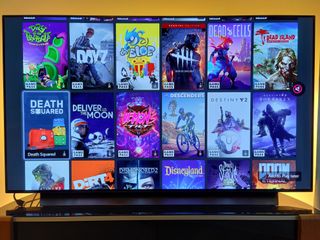
Xbox Game Pass is like a Netflix for games service, and for a monthly fee grants access to hundreds of games.
And, talking of games, it's at this part of the review that things start to get interesting, and no so clear cut. I think it's fair to say that the Xbox Series X hardware and features (highlight features are covered below) is an absolute home run for Microsoft.
However, when it comes to games, things are a little greyer.
Let's talk Xbox Series X Optimized games first, though. As part of the Series X launch program, a number of Xbox games (past-gen and new) have been optimized to run on the system, offering faster load times, higher framerates at 4K resolutions, as well as more eye candy, like real time ray tracing. You can see a list of these games on the official Xbox website.
Games look better, run better and load better
Forza Horizon 4, Ori and the Will of the Wisps, Dirt 5, Assassin's Creed Valhalla, and Watch Dogs: Legion are a sample of these titles and – from what I've played of Forza, Ori, and Dirt 5 while reviewing the console – these optimisations are really well implemented.
The games look, run, and load better, and I would really, really struggle to go back to the last-gen hardware after experiencing them on Xbox Series X.
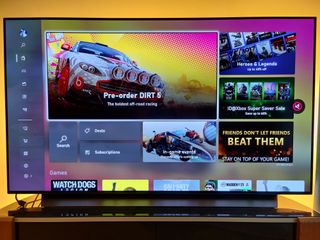
There were few new games that I could play during my testing time that showed off the Xbox Series X's next-gen power.
However – and I feel I have to mention this – at the time of publication I still have not played two of the only genuinely new launch games in the Xbox Series X launch library of games.
Assassin's Creed Valhalla, which is arguably the new game that Xbox Series X is being sold on, is still locked away from me, along with Watch Dogs: Legion. I can't speak about these games and how they run on Xbox Series X in this review, as I simply haven't had the chance to play them.
And, what's more, the fact that the few new games that are launching with the Xbox Series X can't be played, that I can't even get a taste of how new cross-gen games run on the Xbox before this review goes live, really hammers home for me the lack of new, and specifically new exclusive, games to play on Xbox Series X right now.
I can't speak about these games and how they run on Xbox Series X
I mean, this flagship next-gen console isn't even launching with a new Halo game, let alone a new Gears, or Forza. There's also no new stand-out IP, either. And when the third party offering is so tiny (and untested during review), I do have to wonder how many people will be left slightly disappointed with their $450/£450 purchase initially.
Initially is definitely the word, though, I think; as I mentioned above, I think this is a fantastic games console and one that will really go the distance for its owner over time. In terms of the hardware package you're getting, it's immense, but equally it is true that at launch we've not really got a taste of the next-gen at all, and what next-level gaming experiences the Series X can deliver – instead we must be content with upgraded cross-gen, or past-gen experiences.
Whether or not this bothers you of course will be subjective, but for me – as a guy who has reviewed multiple games consoles over the years – I did find it odd to be reviewing a new console with games that I've either played before, or am already aware of from the last gen.
Xbox Series X review: features and controller
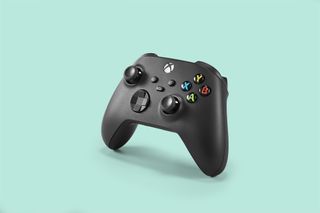
Xbox gamers will find the Series X controller very familiar.
The Xbox Series X comes with the new design wireless Xbox Controller, which anyone who has spent any time with an Xbox One console will be very familiar with. The new controller essentially shares the same design as the previous model, but has a few more design elements from the Xbox Elite Wireless Controller 2, which grants it a slightly more premium and mature aesthetic.
In the hand, this controller is as comfortable as ever, and comes with nice details like textured triggers and bumpers (great for keeping a firm hold when the action gets intense), and an updated hybrid D-pad that has been optimised for faster and smoother inputs.
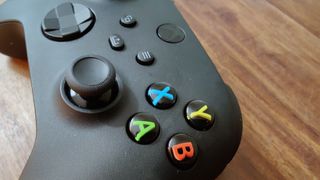
The D-pad had been redesigned on the Series X controller.
As before, too, you get share, menu, and options buttons on this new wireless controller, which quickly allow you to record your gaming sessions, and access options. Naturally, the Xbox power button on the controller remains, as too do the XYBA button config, and dual thumbstick design.
The controller's finish is the same, slightly coarse, matte black that past Xbox controllers have used, which looks clean and mature and isn't too slippery. It does tend to attract finger smudge marks though, so for those gamers who like to keep their kit looking box fresh, regular cleaning will be in order.
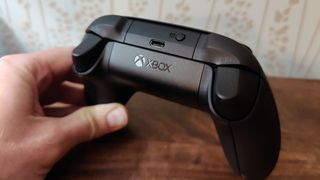
Direct wired connections are handled by a USB Type-C port.
The last point of note – and something that I've never been a big fan of – the Series X controller is still powered by removeable AA batteries.
Now, look, I know that Microsoft's official stance on this is that the company speaks to many gamers, and they say that they want controllers with removable batteries as it supposedly gives them a longer shelf life because they're easier to replace than fixed-in cell stacks like on PlayStation consoles.
I personally have never had a single controller with fixed batteries die on me
However, I personally have never had a single controller with fixed batteries die on me and need to be written off due to it costing too much to fix. I've used PlayStation 3 and 4 controllers consistently for over a decade, and every single one is still delivering the power I need to game wirelessly. And when the controllers do run low on juice, I simply plug them in.
Again, like with my opinion on the console's design, you may disagree, but I personally find it a bit annoying to make sure I constantly have to buy batteries to feed into Xbox controllers.
There's also something not particularly advanced about it in my mind, something where the seams are visible so to speak. I want my controller and console to work as one, and not be reliant on batteries like a Nintendo Game Boy was in 1989.

The Xbox Series X controller is powered by two AA batteries.
In terms of features, one of the best the Xbox Series X delivers is undoubtedly its quick boot functionality. This is a system that makes full use of its rapid next-gen Xbox Velocity Architecture to get gamers into the action quicker and slicker than anything we've seen before, like it does in the aforementioned 'Quick Resume' functionality.
Check out the video below to see the Xbox Series X go from off, to ready-to-game in mere seconds:
Another feature that I think is really well implemented is its storage expansion. This comes courtesy of a rear-mounted expansion port, which when fed with an expansion card (check out T3's Seagate Storage Expansion Card for Xbox Series X|S review for a great choice at launch) immediately injects the system with more room for games and media.
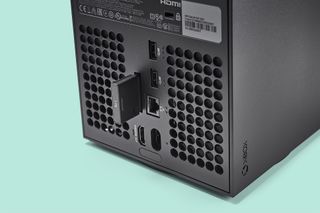
The ability to upgrade your storage so easily is a great Xbox Series X feature.
What makes it so useful is that there is no painful installation procedure requiring tools, and no extra software or updates needed for it to work. It is purely plug-and-play, and while the Xbox Series X does deliver about 800GB of room for games out of the box, hardcore gamers will definitely benefit from more storage in my opinion.
Especially as proper next-gen games start to emerge, which almost certainly will demand even more installation space than games do now.
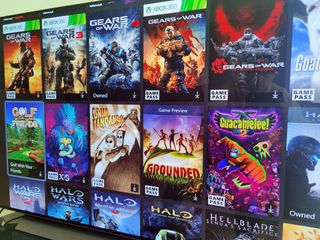
Xbox Game Pass is one of the Xbox Series X's standout features.
Lastly, in terms of standout features, the Xbox Series X's ability to play games going back three console generations – even back to the original Xbox console – is definitely something that Microsoft needs to be applauded for.
This ability to play the lion's share of past-gen Xbox games is buoyed by Xbox Game Pass, and while the service isn't free ($14.99/ £10.99 per month), it does mean that, for very little money each year, you can have access to a truck-load of great games to play at any time, from any past generation going all the way back to the original Xbox.
The one thing you can't say is that there is nothing to play on it
Yes, as I mentioned above, the Xbox Series X is launching with an underwhelming launch library of new and, specifically, new exclusive games, but the one thing you can't say is that there is nothing to play on it.
Of course, you can play all these games on past-gen Xbox systems, too, even if they won't load or run as well as they do on Series X. Take from that what you will.
Xbox Series X review: verdict
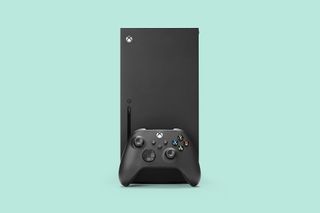
The Xbox Series X is a powerhouse with hardware that will go the distance.
Truth be told, this is one of the hardest console reviews I've ever done. That's because I feel the Xbox Series X raises raises the question of what we should expect from a video game console in 2020 and, what's more, I think the answer probably runs contrary to what a lot of gamers have grown up being used to.
I think it's fair to say that, historically, traditional gen-switching video game console launches have come with order of magnitude leaps in graphical fidelity, gameplay, and features. When, for example, the Nintendo 64 launched, it was sold alongside Super Mario 64, which comprehensibly raised the bar in terms of what was possible on a video game console.
That leap from the 2D side-scrolling Super Mario World on Super Famicom, to the fully 3D Super Mario 64 on N64 communicated the generational leap incredibly vividly. Equally, the jump say, from Sega Saturn to Sega Dreamcast, was marked thanks to Sonic Adventure.
And who can forget the original Xbox launch title, Halo: Combat Evolved, the game that would go on to spawn one of the most beloved and played series of all time. That game looked amazing for a console game at the time, and changed the landscape at the console's launch.
In the most reductive terms, these consoles were sold by astounding new games that delivered graphics, gameplay, and audio that was orders of magnitude greater than anything the past gen delivered. It was an easy, very direct sell.
With this generation, and specifically with the Xbox Series X, those games don't exist.
The Xbox Series X launch line-up of new, exclusive games is (by traditional standards) underwhelming; the reason to upgrade not so obvious.
And, when the console costs half a grand, that does throw doubt into the decision making process in my mind. Xbox All Access does soften this a bit, but due to the lack of consoles available at launch, not enough gamers will be able to take advantage of this.
Instead, the system is launching with a bunch of optimized past-gen games and a few new cross-platform AAA third-party titles, which are cross-gen and, in the nicest possible way, tied at their core to last-gen consoles. The experiences they deliver benefit from the extra eye candy, loading times, and framerates that the Series X is capable of, and – as I've written before – these do enhance immersion and gameplay. But what they don't do is shift the video game bar significantly.
Microsoft has certainly swung for the fences with the Xbox Series X
Now, look, in raising these facts I am not casting negative judgement, and as I've mentioned above, I have been very impressed with how much better quality last-gen titles like Forza Horizon 4 look and run on Xbox Series X. I simply couldn't go back to using even the Xbox One X, let alone an original Xbox One. The drop in load times, graphical fidelity, and extra features would be too hard to take.
However, I do raise them to ask if new-gen console launches are now this evolutionary rather than revolutionary? In addition, should I expect to play new games with a new-gen console launch? And what about exclusives? I think the answer is yes.
What you get with the Xbox Series X right now, though, is a way to play a lot of great games in the best possible way on console, while also securing your ability to enjoy proper next-gen games when they eventually appear, which will likely be mid-to-late next year. I'm happy with that, but I would be happier if I was playing Halo Infinite right now, and seeing this incredible system flex its muscles.
I feel this shift in consoles has come as they've gotten increasingly close to gaming PCs over the past few gens, and just as PC gamers are used to, console gamers are now going to have to get used to much more evolutionary upgrades in terms of console generations while remaining in the same gaming ecosystem overall.
None of these musings escape the raw facts, though. The Xbox Series X is the best Xbox console you can buy today (maybe the best console full stop), and it provides a platform that is guaranteed to deliver some truly astounding, new game experiences over its lifespan – but right now gamers should ring it up with open eyes, and with the understanding that the new is not here yet in terms of software. A large part of that $450/£450 investment is very much tied up in the future.
This could very well be the last console generation we ever see with this sort of traditional in-the-home hardware, though, and if it is, then Microsoft has certainly swung for the fences with the Xbox Series X. This is a console that can go the distance and, for that reason more than any other, I wholeheartedly recommend it to gamers the world over.
- Xbox Series S unboxing video: Microsoft's all-digital console package opened
Sign up to the T3 newsletter for smarter living straight to your inbox
Get all the latest news, reviews, deals and buying guides on gorgeous tech, home and active products from the T3 experts
Rob has been writing about computing, gaming, mobile, home entertainment technology, toys (specifically Lego and board games), smart home and more for over 15 years. As the editor of PC Gamer, and former Deputy Editor for T3.com, you can find Rob's work in magazines, bookazines and online, as well as on podcasts and videos, too. Outside of his work Rob is passionate about motorbikes, skiing/snowboarding and team sports, with football and cricket his two favourites.
-
 Double O-heaven? Could this hybrid be James Bond's next ride?
Double O-heaven? Could this hybrid be James Bond's next ride?Hybrid Aston Martin Valhalla is finally here, and I can't wait to drive it
By Alistair Charlton Published
-
 Here's 5 things to try with Apple Intelligence
Here's 5 things to try with Apple IntelligenceApple Intelligence is finally available. These are the first things to try out once you've updated your iPhone
By Mat Gallagher Published
-
 Apple Vision Pro could be used to attend live football from anywhere – one major club has already confirmed plans
Apple Vision Pro could be used to attend live football from anywhere – one major club has already confirmed plansImmersive football in your front room - yes please
By Chris Hall Published